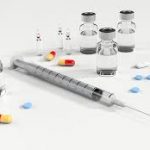
Insulin
Insulin is a protein hormone produced by the beta cells of the islets of Langerhans in the pancreas. Its function is to regulate blood glucose levels by lowering blood sugar levels when it rises excessively after consuming large amounts of carbohydrates. Insulin activity develops by stimulating the uptake of glucose by muscle cells and adipocytes. Its action, however, is not limited to the activation of glucose uptake, in fact, it contributes to the accumulation of all taken nutrients, therefore, in addition to sugar, cells activated by insulin also absorb proteins and fatty acids, promoting tissue anabolism through protein synthesis in muscles, glycogen synthesis in muscles and liver and lipogenesis in adipocytes.
Affects muscles Promotes protein synthesis, glycogen synthesis, promotes the absorption of amino acids Effects on adipose tissue Promotes the deposition of triglycerides, inhibits lipolysis, promotes the absorption of glucose and fatty acids.
Insulin is used as a drug in the treatment of type 1 diabetes mellitus, a special pathology characterized by the inability of the pancreas to produce the hormone in question, this determines ketoacidosis, a special state of toxicity, due to the fact that the body must use ketone bodies to supply the brain with energy ; in addition, the accumulation of glucose in the blood (hyperglycemia) determines the denaturation of proteins and their accumulation in the kidneys with subsequent loss of water and dehydration. Increased hyperglycemia can lead to coma and death.
Another form of diabetes, called type 2 diabetes, is characterized by cell insensitivity to the action of insulin, for this pathology treatment is based on different drugs.
As already mentioned, insulin is a highly anabolic substance, it serves as a signal for muscles to absorb amino acids and glucose, as well as activate protein synthesis processes, especially under conditions.In fact, due to malnutrition, insulin-induced anabolism occurs only under conditions of excess calories, carbohydrates and proteins.
Athletes, in particular bodybuilders, are looking for an anabolic effect to increase muscle mass.

Insulin works synergistically with anabolic steroids and GH. In practice, these substances, taken together, have effects that exceed the effect of the sum of each individual substance. (We recommend to athletes hygetropin) Therefore, very often bodybuilders take insulin along with steroids and / or GH and / or growth factors.
There are many risks a person is exposed to when using insulin, in fact, overdosing or not consuming enough glucose can lead to hypoglycemia, which can lead to death and death. It is known that in the past, insulin shock was used to calm patients with schizophrenia.
Thus, insulin is a substance with a pronounced anabolic effect that athletes can use to:
- increase muscle mass
- increase glycogen stores before a competition
There are different forms of insulin on the market with different durations of action, in fact they are defined as ultra-fast and fast-acting insulins. , medium, long and extra long.
Fast-acting insulin is preferred by athletes because it is easier to administer and users say it reduces the risk of fat accumulation. As mentioned at the beginning of this chapter, this hormone also has an anabolic effect on adipocytes, and its action on these cells causes the accumulation of fat.

Dosages used to increase muscle mass are approximately 1 IU. take every 10/20 kg of weight 1 to 3 times a day. In particular, insulin is used immediately after exercise to maximize the so-called “anabolic window”, a period after exercise in which muscles activated by exercise are more responsive to the action of insulin itself and therefore better absorb nutrients. p>
Insulin lispro (Humalog)
Superfast acting insulin, acting over 2/3 hours, takes effect in 10 minutes.
Regular insulin (Humulin-R)
Fast acting insulin, active for 6/8 hours, takes about 30 minutes to work.
Isophanic insulin (Humulin-N )
Insulin with an active intermediate effect within 10/13 hours takes effect in about 2 hours.
Zinc insulins in suspension (Humulin-U)
I am several long-acting and ultra-long-acting insulins, depending on the form of association with zinc, are active for 24 hours and take effect 3/4 hours after administration.
Dirk otropin
Corticotropin or adrenocorticotropic hormone (ACTH) is a pituitary protein hormone that controls the activity of the adrenal cortex. Its action stimulates the production of glucocorticoids and mineralocorticoids.
This hormone is used in medicine for diagnostic purposes to assess the functionality of the adrenal glands.
Corticotropin can be used in sports. with the intention of increasing cortisol production in order to reap the benefits in terms of energy output arising from the hyperglycemic action of glucocorticoids useful in endurance sports. This substance is also included in the list of substances prohibited by anti-doping rules, although there are doubts about its real effectiveness as an ergogen, given that several studies designed specifically to test possible benefits for athletes have not found any improvement in performance (Soetens, Baumen).
However, as mentioned, corticotropin is also banned by anti-doping rules, as taking ACTH before a competition can help maintain the energy reserves needed for performance. The side effects of this practice are those that occur when glucocorticoids are misused, so see the glucocorticoid chapter for more information.
